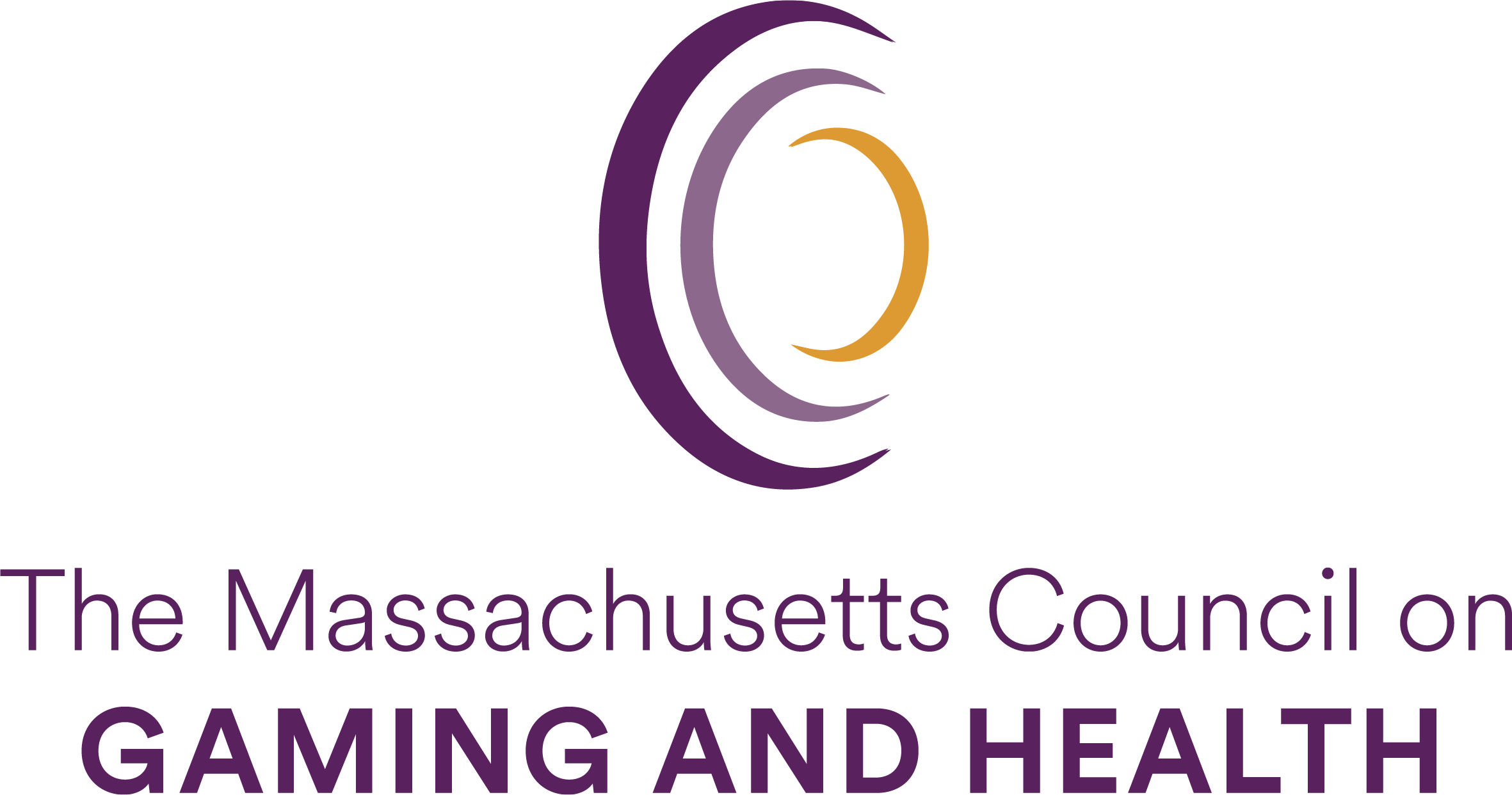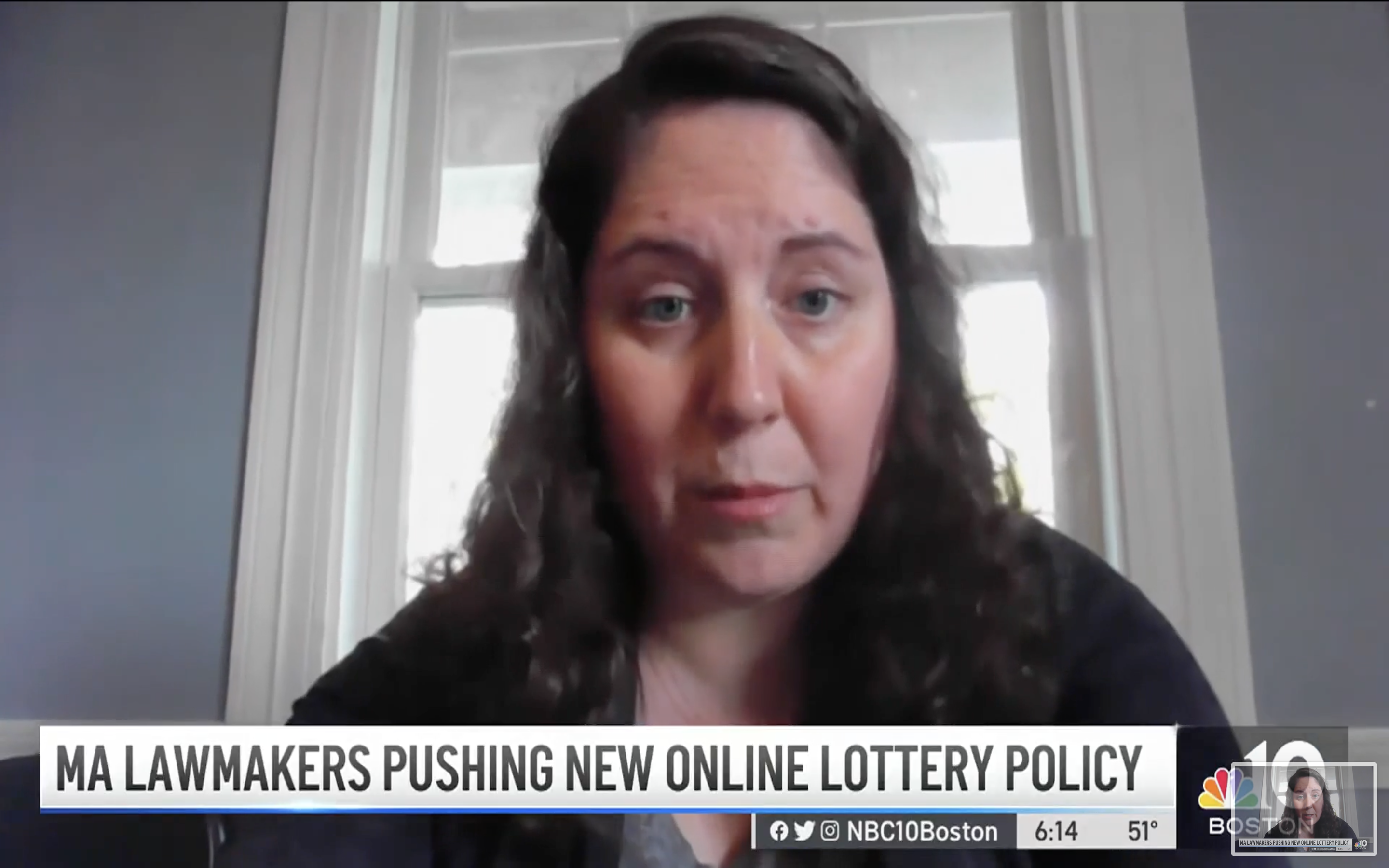[et_pb_section fb_built=”1″ _builder_version=”4.7.7″ min_height=”4171.6px” custom_margin=”0px||||false|false”][et_pb_row _builder_version=”4.7.7″ _module_preset=”default” min_height=”437.5px” custom_margin=”-55px||||false|false”][et_pb_column type=”4_4″ _builder_version=”4.7.4″ _module_preset=”default”][et_pb_divider _builder_version=”4.7.4″ _module_preset=”default”][/et_pb_divider][et_pb_text _builder_version=”4.9.0″ _module_preset=”default” custom_margin=”-20px||||false|false” hover_enabled=”0″ sticky_enabled=”0″]
- MACGH Uses Problem Gambling Awareness Month to Push Increased Player Safeguards & Research – Marlene Warner, Executive Director of MACGH, talks with Colin A. Young of Statehouse News Service about pending sports gambling legislation.
- The Gaming Health Specialist Certificate Program – The Mass Council has created the Gaming Health Specialist Certificate program. This certificate assured that clinicians have the foundational knowledge needed to address problematic gambling and Internet gaming behaviors and meets the needs of a growing number of clients presenting with co-morbid disorders.
- GameSense and Problem Gambling Awareness Month -March is Problem Gambling Awareness Month (PGAM!) While this year may look and feel a little different, it will still be just as busy for the GameSense team.
- Kopel’s Corner Race/Ethnicity and Income Differences and Gambling Disorder- The social determinants of health are the economic and social conditions that influence individual and group differences in health status.
- Upcoming Trainings– See our upcoming training opportunities HERE!
[/et_pb_text][et_pb_divider _builder_version=”4.7.4″ _module_preset=”default”][/et_pb_divider][/et_pb_column][/et_pb_row][et_pb_row _builder_version=”3.25″ background_size=”initial” background_position=”top_left” background_repeat=”repeat”][et_pb_column type=”4_4″ _builder_version=”3.25″ custom_padding=”|||” custom_padding__hover=”|||”][et_pb_text _builder_version=”4.9.0″ background_size=”initial” background_position=”top_left” background_repeat=”repeat” hover_enabled=”0″ sticky_enabled=”0″]
MACGH Uses Problem Gambling Awareness Month to Push Increased Player Safeguards & Research

Marlene Warner, Executive Director of MACGH, talks with Colin A. Young of Statehouse News Service about pending sports gambling legislation. Read more, here.
The Gaming Health Specialist Certificate Program
 At a prevalence rate of about 2 percent for each disorder, problematic gambling behavior and hazardous gaming behavior affect millions of families nationwide. Early data suggests that COVID-19 has had a significant compounding effect on both gaming and on-line gambling behaviors, and many expect an increase in demand for treatment when the quarantine ends. Despite this, relatively few clinicians nationwide actually have the training and expertise needed to effectively identify and treat these issues in the clinical setting.
At a prevalence rate of about 2 percent for each disorder, problematic gambling behavior and hazardous gaming behavior affect millions of families nationwide. Early data suggests that COVID-19 has had a significant compounding effect on both gaming and on-line gambling behaviors, and many expect an increase in demand for treatment when the quarantine ends. Despite this, relatively few clinicians nationwide actually have the training and expertise needed to effectively identify and treat these issues in the clinical setting.
While gaming and gambling disorder engage the same neural pathways as substance use disorder, there are unique challenges in both assessing for and treating these disorders that providers may be unaware of. Families seeking help for loved ones may struggle to find a counselor that truly understands special issues related to gaming or gambling.
To this end, the Mass Council has created the Gaming Health Specialist Certificate program. This certificate assured that clinicians have the foundational knowledge needed to address problematic gambling and Internet gaming behaviors and meets the needs of a growing number of clients presenting with co-morbid disorders. The Gaming Health Specialist Certificate;
- Offers others an easy way to comprehend your professional experience and understanding of the rapidly growing field of gambling, online gaming, and internet gaming disorder.
- Ensures that you have up to date information from the MA Council on Gaming and Health regarding the latest research and educational opportunities.
- Allows your treatment agency or private practice to be added to the MA Council on Gaming and Health’s Helpline & web-based referral lists.
For more information about the Gaming Health Specialist Certificate, visit: https://macgh.org/trainings-events/certificate-program-gaminghealthspecialist/
GameSense and Problem Gambling Awareness Month
 Traditionally, PGAM focuses on educating casino staff about responsible gambling (RG) and problem gambling (PG.) This year the primary way we will do this is through weekly digitized quizzes that focus on different elements of RG and PG.
Traditionally, PGAM focuses on educating casino staff about responsible gambling (RG) and problem gambling (PG.) This year the primary way we will do this is through weekly digitized quizzes that focus on different elements of RG and PG.
Casino staff test their own knowledge by taking one, or more, of these quizzes as outlined below:
WEEK ONE: Positive play
WEEK TWO: Voluntary Self-exclusion
WEEK THREE: March Madness and Sports Betting
WEEK FOUR: PG Resources in Massachusetts
We are also educating casino staff and patrons through internal messaging throughout each of the three casinos, external messaging and through robust social media efforts. Plainridge Park Casino also went the extra distance and is having an internal contest to incentive folks to come up with the best RG and PG messages that they are posting daily.
This year, we are also focusing on educating patrons and will be using large screen monitors and flashcards to safely administer educational activities. In addition, we are working with the promotions departments at MGM and EBH to administer additional flashcard quizzes for their employees.
March 9 will be an extra special day where all GameSense staff encourage patrons and casino staff to participate in National Gambling Disorder Screening Day, a project we annual embark on with Cambridge Health Alliance. See more, here.
MACGH is also contributing to the fanfare by leading a training on RG and PG resources for the Asian community, and introducing LiveChat, another important RG tool.
Lastly and significantly, we helped to secure a proclamation from Governor Baker in support of Problem Gambling Awareness Month. We are one of approximately ten states nationally to secure the support of their Governor.
To stay up to date on the latest on GameSense program activities, follow us on your social media platforms, or visit GameSenseMA.com!
Kopel’s Corner: Race/Ethnicity and Income Differences and Gambling Disorder
 In the United States, a country with a long history of race relations that includes state sanctioned slavery, racial segregation, and policies of economic marginalization, it is impossible to look at health status of African Americans without taking these factors into account.
In the United States, a country with a long history of race relations that includes state sanctioned slavery, racial segregation, and policies of economic marginalization, it is impossible to look at health status of African Americans without taking these factors into account.
Multiple research studies cite the significant increased prevalence of gambling disorder among the African American population compared with the White population. However, much of the research does not adequately address other variables that could present more insight into this phenomenon.
In this reviewed article, “Evaluating for Differences by Race/Ethnicity”1 multi-variable logistic regression analysis was used to determine association and causation.
This research determined that those with a gambling disorder were significantly more likely to be those with low income. Because of economic policies of disinvestment in communities of color, exclusion from higher wage jobs, unequal lending practices and other race-based policies that advantage the White population, the African American population in the US typically skews dramatically lower income compared with the White population.
The Federal Reserve reports a very wide wealth gap by race and ethnicity. In the 2019 Survey of Consumer Finances (SCF) they report White families have the highest level of both median and mean family wealth: $188,200 and $983,400, respectively. Comparatively, Black families’ median and mean wealth is at $24,100 and $142,500, respectively, and Hispanic families’ median and mean wealth is $36,100 and $165,500, respectively.
In this study, when controlling for race/ethnicity, there was no evidence to show race/ethnicity was a factor. In other words, one could deduce that the primary reason that the African American population has a significantly higher level of gambling disorder is more likely due to higher percentages in low-income categories and not due to perceived racial, cultural, or ethnic differences. Therefore, as we look toward racial inequity when it comes to gambling issues, economic disparity is a significant contributor that needs to be addressed. This research suggests that interventions supporting economic development and access to higher wage jobs may provide a protective buffer when it comes to gambling disorder.
- Day, B. et al. Evaluating for Differences by Race/Ethnicity in the Association Between Income and Gambling Disorder. J Gambl Stud 36, 1093–1105 (2020).
[/et_pb_text][/et_pb_column][/et_pb_row][/et_pb_section]




